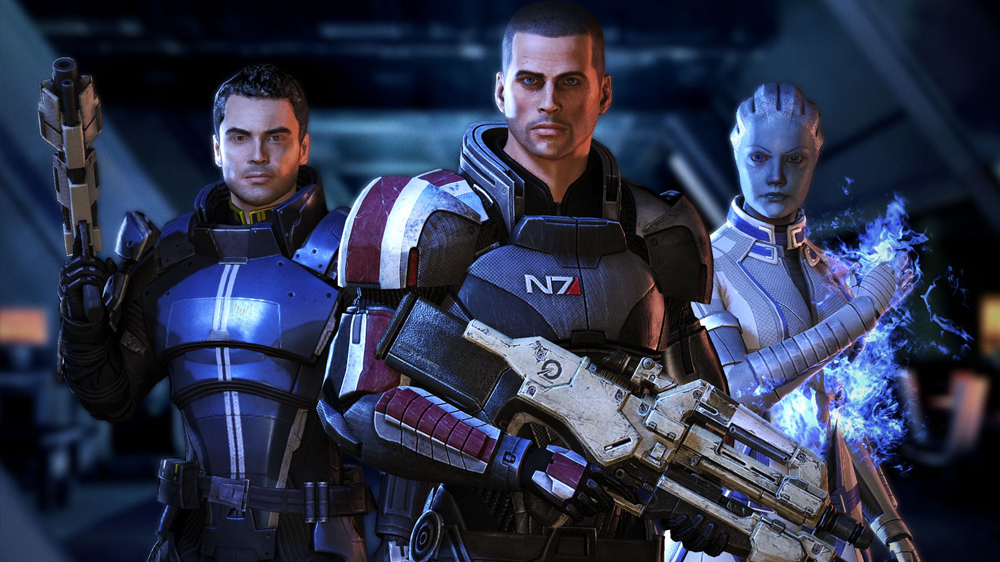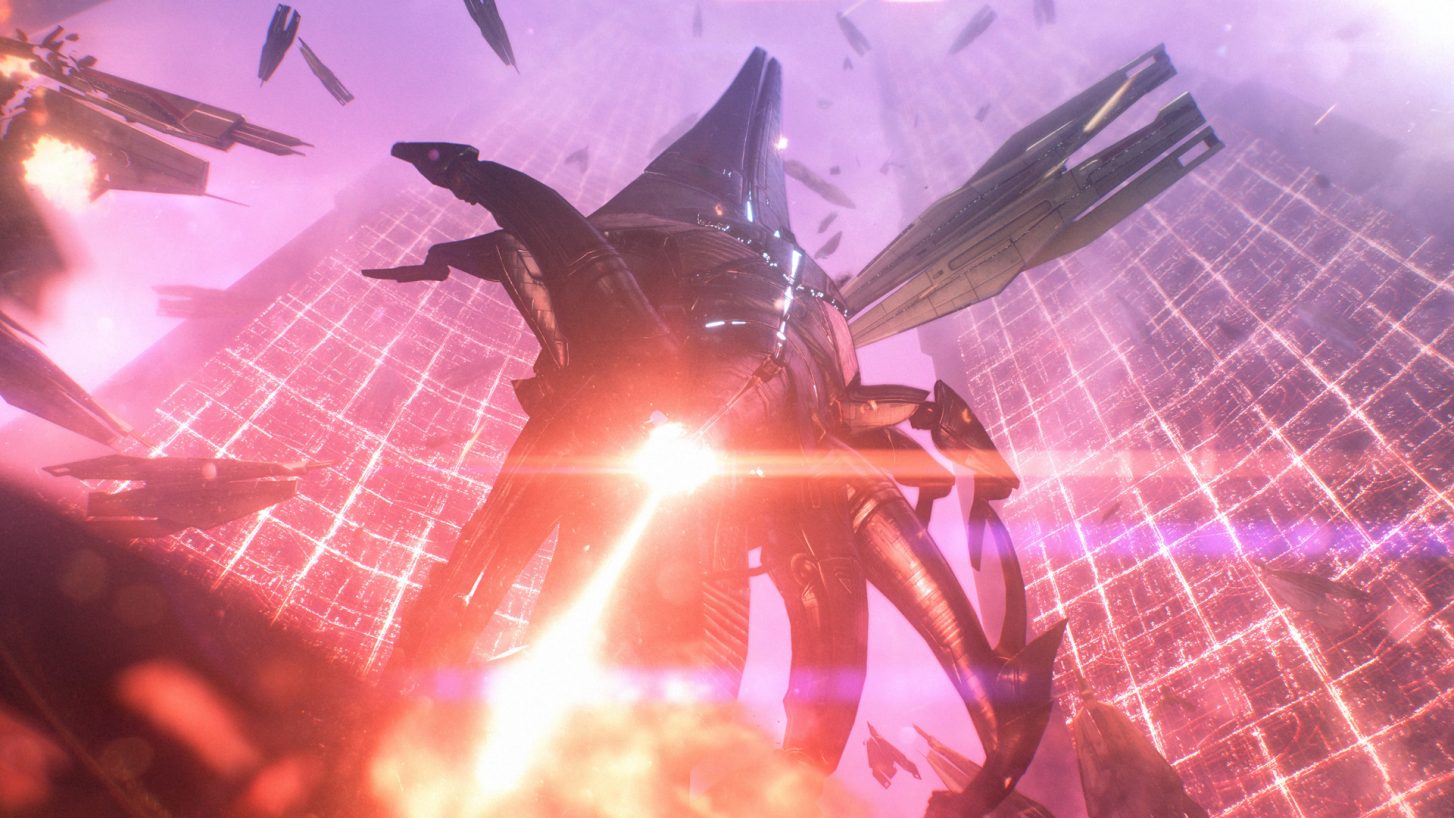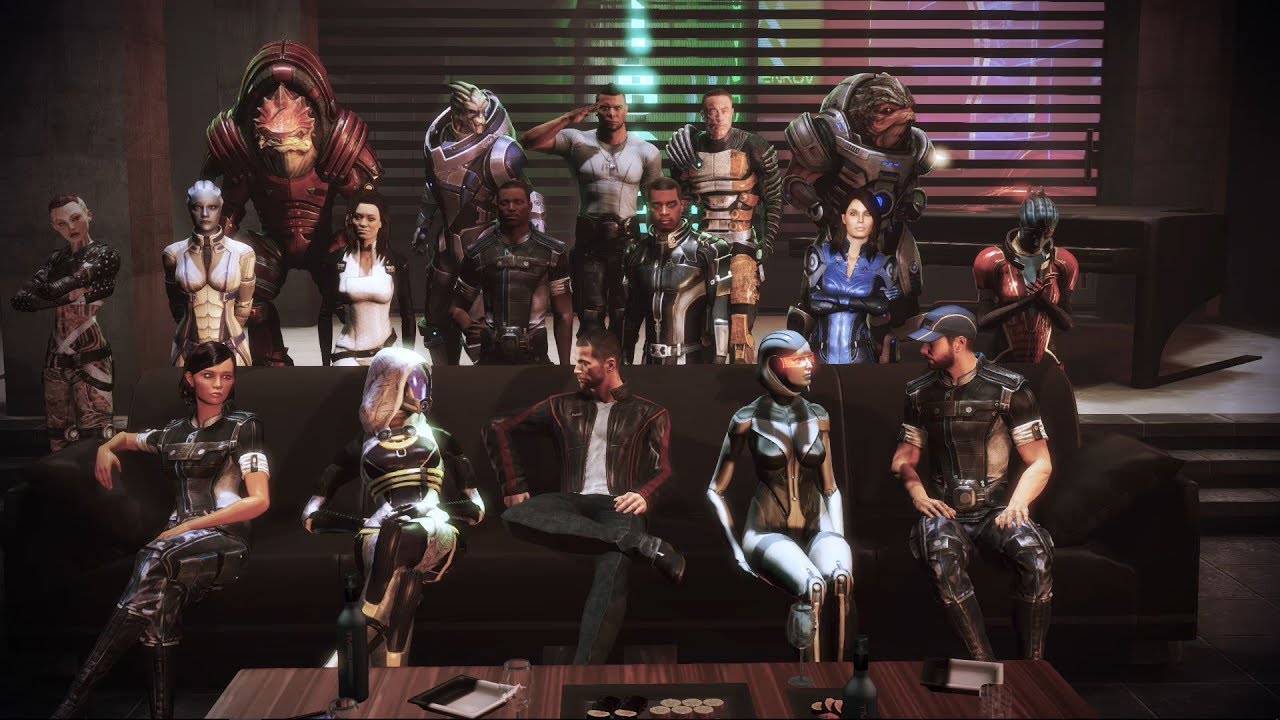10 years later, the Mass Effect 3 ending controversy still haunts gaming culture
For better or for worse, videogames in 2021 are collaborative projects.

I first heard about player choice in the original BioShock. It was 2007, and I was sitting in front of the blocky family Dell and a thick CRT monitor watching 360p E3 coverage as Ken Levine seductively revealed the intricacies of the ecosystem in Rapture. We could rescue all of these little girls, he said, but we could also harvest them for their genetic resources.
That binary is downright laughable in retrospect; here was this meditative videogame with Kubrick ambitions, and yet the only way it could introduce any ethical quandary to the narrative was through… the literal murder of children? Whatever. It didn't matter. I was ensorcelled by BioShock's attempt to embody the grim, philosophic future of the interactive arts. At last, a chance to leave a permanent mark on the worlds we inhabit, to negotiate freedom from the disc. The new game auteurs were going to break from the past. Ken Levine was going to make me a little bit uncomfortable, and I relished the opportunity.
Five years later, a riot broke out.
A tattered Commander Shepard stood at the crucible, and decided which way he would put an end to the Mass Effect universe. Would he destroy all synthetic life in the galaxy in the blink of an eye? Would he give his mortal shell over to the AI and emerge as a sweatless, Star Trek Q-style deity, that's about a million miles removed from the character's original all-too-corporeal appeal? Or would he simply get down to some Deus Ex Machina business, and "merge" the tendencies of synthetic and organic life together, leaving behind a minefield of plot holes?
We do not need to relitigate any of the Mass Effect 3 endings. In fact, I reckon that no story sequence has sparked more thinkpieces, chaffed podcast debates, and locked message board threads in recent videogame history. If you are entirely divorced from the discourse, it can be best summed up this way: Mass Effect 3 concluded in an overstuffed 15 minute climax that took some bold, perhaps reckless risks with its tone, cast, and story implications. Fans were apoplectic.
It just snowballed like crazy, and pretty soon the whole issue was on fire.
If that sounds familiar to you, it's because Mass Effect 3 has become the blueprint for all varieties of insurrection. When Shepard chose his path and ignited the internet, geekdom as a unilateral pop cultural force was rounding into form. Years later, Disney financialized the Marvel brand into a juggernaut, causing every production house on the planet to desperately carve out their own bespoke multiverses worshipped by a global community of enthusiasts. But in 2012, I'm not sure if anyone fully understood the degree to which fans could influence the properties they love—especially when faced with a plot choice they didn't agree with.
"It's incredibly painful to receive feedback from our core fans that the game's endings were not up to their expectations," BioWare co-founder and general manager Ray Muzyka said at the time, as the rancor was picking up. "Our first instinct is to defend our work and point to the high ratings offered by critics—but out of respect for our fans, we need to accept the criticism and feedback with humility."
The biggest gaming news, reviews and hardware deals
Keep up to date with the most important stories and the best deals, as picked by the PC Gamer team.
It is a revelatory quote, and initial proof that for as much as this new generation of game studios dreamt of auteur autonomy, the customer was always right. Convictions be damned.
BioWare would eventually fulfill that pivot. Three months after the backlash, Mass Effect 3 earned an airbrushing in the form of an "Extended Cut," which sanded away some of the chief complaints. The Mass Relays survived, as did many of Shepard's crew mates. If you played your cards right, there is a chance the Normandy blasts off from the planet it crash-landed on in the epilogue, offering palliative care to the many bereaved hearts in the pickled gamer symposium. Once upon a time, it wasn't possible to retcon on the fly. George Lucas waited decades before he had the chance to smooth over the loose ends in the first Star Wars trilogy, but this nascent generation of gamers correctly predicted that with the dawn of live games and constant DLC maintenance, they could put the screws to BioWare and demand the gratification they wanted. It worked, and the industry hasn't been the same since.
Joshua Rivera published a good take on this at the end of 2019 for Kotaku. He noted that "player choice" is a bit of an oxymoron. It doesn't matter how much rope a studio concedes to the player over the course of a game story; the director at the far end of the table still holds all the cards.
"Constraints that are easy to accept if you are Mario choosing one path over another become harder to grok in a narrative determined to woo you into believing your choices matter in a way that transfers authorship to you," wrote Rivera. "Mass Effect is videogames’ own sword of Damocles finally coming loose. A franchise that emphasized choice so much that when its final act made a decision players did not care for, they chose not only to reject it but to demand it be changed."
In that sense, perhaps Mass Effect was doomed from the start. All of the rent accrued over the trilogy—the incisive conversations with suspicious crew members, the emotional devastation during its fork-in-the-road moments, the ownership that BioWare claimed to offer its players—finally came due. The company needed to end the trilogy and thread the needle. It failed, and there was hell to pay.

"I remember about a week or so after we had launched [the game], we'd seen all these excellent critical reviews," remembered BioWare general manager Aaryn Flynn in an interview with Game Informer in 2016. "Then all of a sudden people were saying, 'I felt the ending was weak.' And someone would say, 'Yeah, I thought it was actually pretty bad.' And someone else would say, 'I hated that ending.' It just snowballed like crazy, and pretty soon the whole issue was on fire."
As the dust settled, it was clear that this game, and all games, would forever be a collaboration with its respective community.
Would Flynn be surprised now? Would anyone? We just watched the exact same cycle two years ago with the final season of HBO's Game of Thrones—another epic that briefly breached into the monoculture—after that series ended with a strange, plaintive whimper. A blunderbuss of petitions, editorials, and death threats punctured the internet right on cue, but unlike BioWare, HBO hasn't made any moves to spruce up the conclusion. We are only a month removed from the final unveiling of the Snyder Cut, after a nation of bereaved DC fans trusted that the ideal Justice League film remained locked away deep away in the Warner Bros coffers. (I suppose they were proven right, in that case.) The Last of Us Part II is perhaps the most profound mutation yet. Fans cancelled pre-orders before the game was even released due to the leaked confirmation of the death of a primary character. In many ways, the Mass Effect 3 controversy taught us how the careening mechanics of fandom were going to work from here on out.
"We've worked towards the goal of killing [the Reapers] for the past three games," reads the inscription posted on one of those "change the ending" signature drives in 2012. "We shouldn't have to sacrifice anything more to watch the Reapers die. Games are supposed to be uplifting and inspirational. They should touch our hearts and inspire us to be better people." It goes on, citing a handful of specific plot points that the author wants edited. Shepard needs to live, they write, and BioWare must include an option to eliminate the Reapers without also destroying the Geth. Here's another petition, this one with 13,000 cosigners: "We demand for EA and BioWare to deliver us an ending DLC that adds what we want, for our choices to affect the game's ending. So if we want to destroy the universe the cycle of destruction continues, and if we get everything perfect we can, just for example, see Liara and Shepard get their little blue children and get old."

Almost ten years later, I'm much more comfortable with living with BioWare's risks.
By the closing moments of the trilogy, the Mass Effect contingency had learned to exploit the company's commitment to fan service—howling through the internet until they received an epilogue that was free of that burdensome tension or melancholia. As the dust settled, it was clear that this game, and all games, would forever be a collaboration with its respective community. By war or by peace.
None of this means Mass Effect 3's ending wasn't disappointing. The vitriol tossed in BioWare's direction remains vile, juvenile, and one of the worst parts of gaming culture, but I think even the most generous of stans can admit that the narrative grew cold in its waning moment—betraying the amiable galactic comradeship of the series. That said, I find myself nostalgic for the salad days, before the internet grew truly shrill and inescapable. Remember when Hideo Kojima stuffed Solid Snake in a closet in favor of a mewling fop named Raiden? There was a certain finality studios wielded when not everything could be addressed in the next patch. Dissatisfied fans still complained and argued online, but could only turn to fanfiction, not successful petitions, for satisfaction. Themes and story beats couldn't be finetuned and focus-tested on the fly. Commander Shepard probably should've never been afforded the opportunity to become a god, but almost ten years later, I'm much more comfortable with living with BioWare's risks.
- Mass Effect guide: Everything to know
- Mass Effect romance: All available characters
- Mass Effect ending: How to keep everyone alive

Luke Winkie is a freelance journalist and contributor to many publications, including PC Gamer, The New York Times, Gawker, Slate, and Mel Magazine. In between bouts of writing about Hearthstone, World of Warcraft and Twitch culture here on PC Gamer, Luke also publishes the newsletter On Posting. As a self-described "chronic poster," Luke has "spent hours deep-scrolling through surreptitious Likes tabs to uncover the root of intra-publication beef and broken down quote-tweet animosity like it’s Super Bowl tape." When he graduated from journalism school, he had no idea how bad it was going to get.

